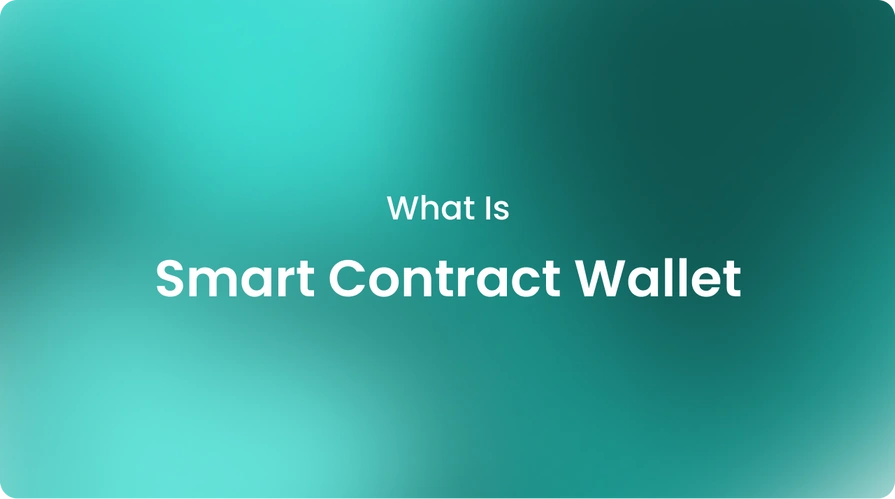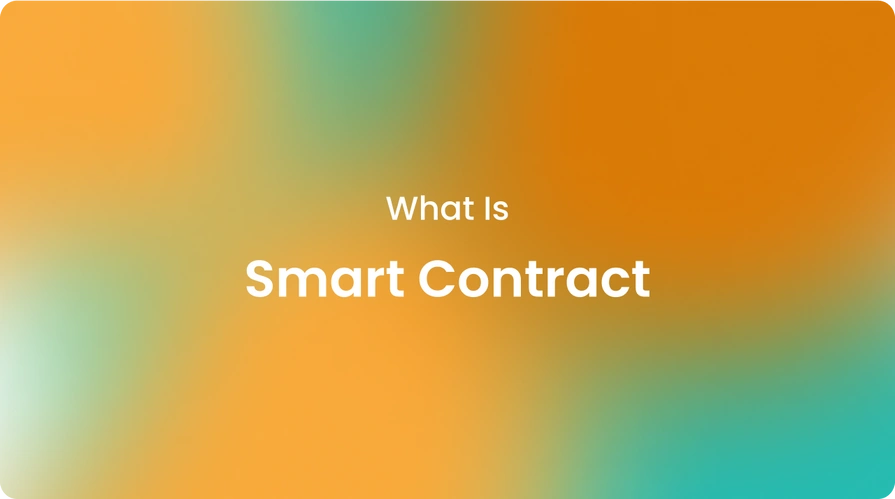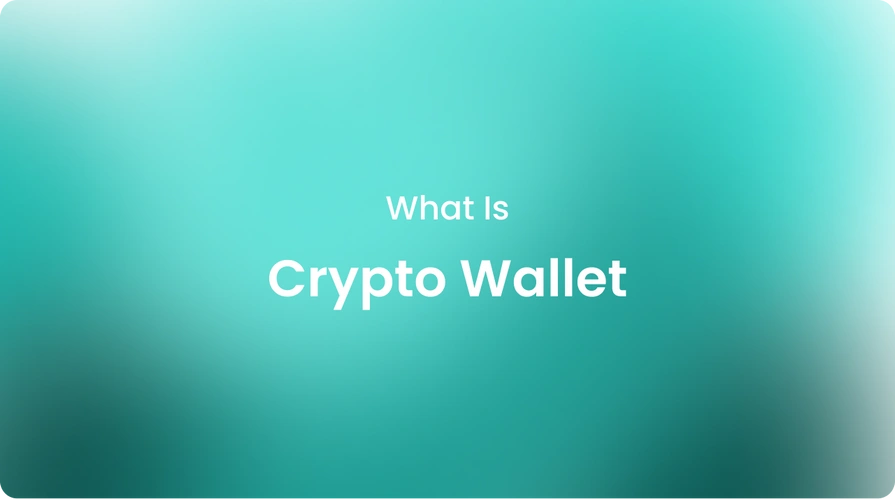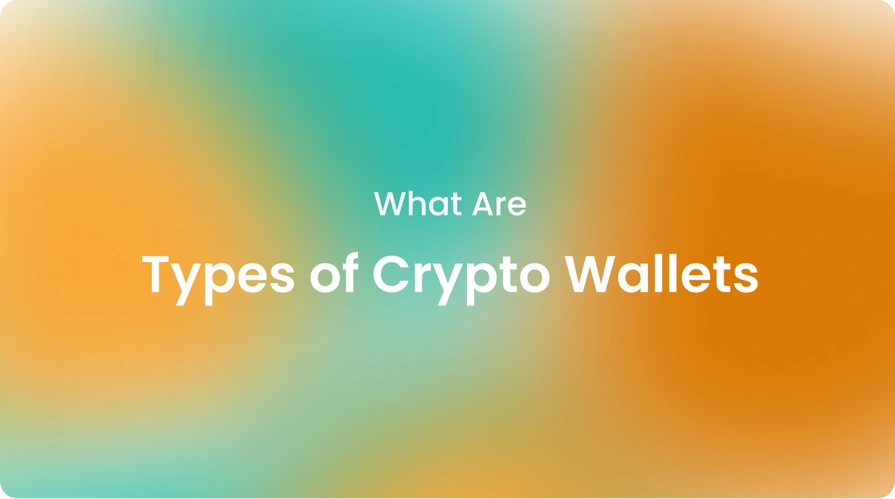|crypto, knowledgehub
What Is a Smart Contract Wallet?

As blockchain technology becomes more prevalent in our daily lives, new and innovative types of digital wallets, such as smart contract wallets, are emerging to safely manage cryptocurrency transactions.
Join us in this blog as we provide an overview of smart contract wallets, a new type of crypto wallet that leverages the power of blockchain smart contracts for added security and functionality.
By the end, you'll understand what makes smart contract wallets different from traditional wallets and know some of the top options available in the market. Let’s begin with understanding smart contracts first!
What are smart contracts?
To understand smart contract wallets, we must first clarify what a smart contract is. Smart contracts are programs stored on a blockchain that carry out the terms of a contract automatically.
Transactions or changes in the blockchain state trigger smart contracts, holding parties accountable without the need for an intermediary.
The smart contract self-executes whenever certain conditions specified in the code are satisfied. This enables the execution of trusted transactions and agreements between untrusted or anonymous parties.
What is a smart wallet in blockchain?
A smart wallet builds upon smart contracts by storing private keys in a smart contract instead of locally on a device. This provides security benefits and new functionality that are not possible with regular software or hardware wallets.
With a smart wallet, private keys never leave the blockchain, and transactions must follow the rules coded in the associated smart contract.
What are multi-signature smart contract wallets?
Smart contracts enable multi-signature wallets to require multiple authorized parties to approve transactions before sending funds. This splits asset control between two or more devices, private keys, or individuals.
Cryptobunq, for example, is a provider of multi-signature smart contract wallets for Bitcoin, Ethereum, and other cryptocurrencies. As a one-stop-shop crypto service provider, Cryptobunq not only provides custody and wallet services but also other services that can benefit your business and projects.
These solutions include crypto checkout and invoicing, crypto exchange API, tokenization, node as a service, batch crypto payments, and more. Make sure to check out our case studies to learn more about our expertise in the Web3 world and our secure crypto services!
The role of multi-signature smart contracts in Web3
As the adoption of cryptocurrencies and digital assets increases, protecting funds becomes ever more important. Multi-signature smart contracts play a key role here because they not only enhance security but also enable new applications.
For example, they allow organizations to split control of funds among departments or executives to prevent misuse and require multiple approvals.
We are also seeing multisignature integrations that require biometric authentication alongside private keys. This opens up tremendous opportunities for building innovative custodial solutions and digital asset management tools.
How do smart wallets work?
Under the hood, smart wallets function through two main types of Ethereum accounts: externally owned accounts (EOAs) and contract accounts. Private keys control EOAs, which are traditional addresses, while blockchain-stored code governs contract accounts.
When a user interacts with a smart wallet, the front-end interface communicates with the smart contract, which then initiates transactions on behalf of the user's EOA while enforcing additional security rules like multisignature approvals.
These encrypted transactions keep funds secure while allowing for greater functionality than regular wallets. Let’s take a closer look at each type!
Externally owned accounts
Private keys control EOAs, which lack inherent code logic. Users own them and can send transactions to interact with contracts and transfer assets. Functionally, an EOA is comparable to a regular software wallet address.
Contract accounts
Contract accounts contain executable code and have no private keys. Their code governs them, enabling them to initiate transactions automatically when specific criteria are satisfied. Any deployed smart contract manifests as a contract account.
Does a smart contract have its own wallet?
In a sense, yes. As we just explained, smart contracts utilize on-chain "contract accounts" to hold and manage assets according to their programmed logic. However, these contract accounts don't function exactly like regular crypto wallets controlled by private keys.
How do smart contract wallets differ from regular wallets?
Now that we've explored smart contract internals, how exactly do smart contract wallets diverge from traditional software or hardware wallets? Here are some key ways:
- Integration of smart contracts allows features like multi-signature, stablecoins, crypto custody, etc.
- Code embeds rules instead of relying solely on private key ownership.
- Wallets can natively support decentralized applications and protocols.
- Autonomous transactions are based on predefined triggers and conditions.
- There is potential for programmable Treasury/escrow-like services.
- You can distribute control as opposed to having a single account responsibility.
- Advanced security comes from code auditing, multi-party oversight, and single-point risk.
- Interfaces vary significantly; regular crypto wallets emphasize simplicity.
The benefits of smart contract wallets
By implementing smart contracts, smart contract wallets provide some clear benefits over traditional options:
- Increased security is achieved through multi-signature, theft prevention triggers, and auditable code.
- Automatic rules simplify complex transaction management.
- Native support for advanced DeFi protocols and dApps.
- Custodial solutions for assets, such as stablecoins redeemable for fiat.
- Programmable risk thresholds and ownership policies.
- Distributed control models that share responsibility.
- Auditable transaction history vs. unexplained private key activity.
- Potential for new Treasury and government applications.
The risks of smart contract wallets
Great new powers come with great risks. Smart wallets introduce some vulnerabilities that regular ones do not:
- Bugs, hacks, and vulnerabilities in contract code are permanent.
- Complex interactions between multiple contracts are difficult to fully audit.
- Upgrades require careful deployment to avoid state changes or loss of funds.
- A complete loss of funds is possible if all owners lose keys to multi-signature wallets.
- Regulatory uncertainty around new features like embedded exchanges
- To properly configure and recover wallets, technical expertise is required.
- Interface flaws could lead to accidental transactions or lockouts.
What is ERC-4337 and what does it mean for smart contract wallets?
Stability is a key attribute that smart wallets enable through the integration of stablecoins and crypto-backed assets. ERC-4337 provides a technical standard for representing these stable tokens on Ethereum.
ERC-4337 smart contracts allow for things like redeemability (burning stablecoins for their real-world underlying asset), verifiability (transparent attestations concerning reserves), upgrades (modifying collateral or rules over time), and interoperability (bridges to other blockchains).
Smart contract wallet examples
Here are some scenarios where smart contract wallets come in handy: Some platforms allow you to sign transactions from your smart contract wallet and swap crypto tokens directly on decentralized exchanges without exposing private keys.
Cryptobunq’s smart contract wallet integrates crypto and stablecoin payment functionality for fast, secure crypto-backed transactions on platforms supporting smart wallets.
If you are wondering about “How to create a smart contract wallet by myself,” we have got you covered too. Creating a smart contract wallet requires technical blockchain development skills, as the wallet's programmable rules and behaviors are defined through smart contracts uploaded to a blockchain.
Therefore, it is better to rely on secure crypto service providers such as Cryptobunq for wallet services. CBQ is an expert that you can trust for your wide range of crypto needs, including wallet solutions!
Smart contract wallets are the interface that brings the powerful capabilities of programmable blockchains to average users. As Bitcoin adoption expands globally, innovations like Cryptobunq can accelerate mainstream crypto usage by creating accessible onramps.
Smart contract wallets are a key piece of infrastructure that helps turn this vision into a reality. If you want to explore these wallets more with CBQ, contact us today!













